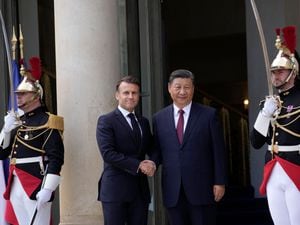Family of US man believed to be held by Taliban seek help from UN
Ryan Corbett’s lawyers say he has been threatened with physical violence and torture, and is malnourished and deprived of care.

Lawyers for an American man believed to be held by the Taliban for nearly two years are asking a United Nations human rights investigator to intervene, citing what they say is cruel and inhumane treatment.
Ryan Corbett was abducted on August 10, 2022 after returning to Afghanistan, where he and his family had been living at the time of the collapse of the US-backed government there a year earlier.
He arrived on a valid 12 month visa to pay and train staff as part of a business venture he led aimed at promoting Afghanistan’s private sector through consulting services and lending.
Mr Corbett has since been shuttled between multiple prisons, though his lawyers say he has not been seen since last December by anyone other than the people with whom he was detained.
In a petition sent Thursday, lawyers for Mr Corbett said that he had been threatened with physical violence and torture, and is malnourished and deprived of medical care.
He has been held in solitary confinement, including in a basement cell with almost no sunlight and exercise, and his physical and mental health have significantly deteriorated, the lawyers added.
Mr Corbett has been able to speak with his family by phone five times since his arrest, including last month.
His family has not been able to see him — his only visits have been two check-ins from a third-party state delegation — and their characterisations of his mistreatment are based on accounts from recently released prisoners who were with him as well as his dispirited tone in conversations.
“During Mr Corbett’s most recent call with his wife and children, Mr Corbett indicated that the mental torture and anguish have caused him to lose all hope,” said the petition, signed by the Corbett family lawyers, Ryan Fayhee and Kate Gibson.
The petition is addressed to Alice Edwards, an independent human rights investigator and the special rapporteur for torture in the Office of the High Commissioner for Human Rights at the UN.
It asks Ms Edwards, who was appointed by the UN Human Rights Council, to “urgently reach out to the Taliban to secure Mr Corbett’s immediate release and freedom from torture, as guaranteed by international law”.
Mr Corbett’s wife, Anna, said in an interview: “This situation is just dragging on, and I’m increasingly concerned and taking steps that I hope will make a difference and help the situation — just increasingly concerned and panicking about Ryan’s deteriorating health and physical and mental health.
The US government is separately working to get Mr Corbett home and has designated him as wrongfully detained.
A State Department spokesman told reporters last month that officials had continually pressed for Corbett’s release and were “using every lever we can to try to bring Ryan and these other wrongfully detained Americans home from Afghanistan”.
A spokesperson for the Interior Ministry in Afghanistan said this week that it had no knowledge of Corbett’s case.
Mr Corbett, of Dansville, New York, first visited Afghanistan in 2006 and relocated there with his family in 2010, supervising several non-governmental organisations.
The family was forced to leave Afghanistan in August 2021 when the Taliban captured Kabul, but he returned the following January so that he could renew his business visa.
Given the instability on the ground, the family discussed the trip and “we were all pretty nervous,” Mr Corbett’s wife said.
But after that first uneventful trip, he returned to the country in August 2022 to train and pay his staff and resume a business venture that involved consulting services, microfinance lending and evaluating international development projects.
While on a trip to the northern Jawzjan province, Mr Corbett and a Western colleague were confronted by armed members of the Taliban and were taken first to a police station and later to an underground prison.
Mrs Corbett said that when she learned her husband had been taken to a police station, she got “really scared” but that he was optimistic the situation would be quickly resolved.
That, however, did not happen, and Mrs Corbett, who has three teenage children and makes regular trips to Washington, said she’s trying to advocate as forcefully as she can while not letting “anxiety take over”.
“I feel like it’s the uncertainty of all of it that just is so difficult because you just don’t know what’s going to come at you — what call, what news,” she said.
“And I’m worried about Ryan and the effect of the trauma on him and then also on my kids, just what they’re experiencing. I’ve tried to protect them the best I could, but this is so difficult.”





